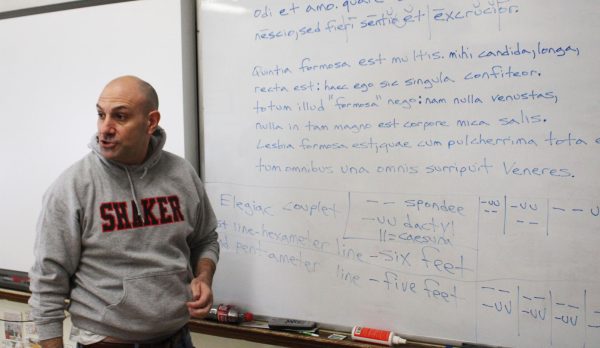High School Students Skeptical of Middle School Grading Policy
Work ethic, cheating among concerns expressed regarding new SMS policy that specifies a 45 percent minimum for all assignments
With the new grading policy, even if all theses worksheets were never submitted, a student would still receive at least 45 percent credit.
During Dr. Hutchings’ State of the Schools address he mentioned changes to the middle school’s schedule and many community members have questions, however in addition to the schedule, the middle school has undergone policy changes.
Shaker Heights Middle School has revamped its grading policy, giving a minimum grade of 55 percent to students for academically dishonest work and adding a new no-zero policy. The lowest grade a student can receive for missing work is now 45 percent.
Erika Neeson, the parent of an eighth grade student, has seen both the previous and current middle school grading policies and isn’t happy about the changes.
High school freshmen, who missed the change by a year, agreed.
“I think it’s dumb because if you don’t do your own work, you shouldn’t get credit,” said freshman Rachel Podl. “Are we teaching middle school students that it’s OK to turn in work that isn’t theirs?”
Freshman Leah Marek concurred. “They should get a zero so they learn the rules,” she said. “Otherwise, those bad habits might follow them to the high school.”
At the beginning of last year, the high school implemented a no-zero policy. However, there is a difference. At the high school, missing assignments are recorded in Progress Book as missing and students do not receive credit until assignments are turned in — and even then there is a late work deduction of up to 30 percent of the final grade.
Barbara Arsham, who is retiring this year from teaching math at the high school, also has concerns about the new policy.
When asked about the idea of having a grading scale without any zeros, Arsham said, “We need to give kids the opportunity to make up material, but you have to do something to earn something,” said Arsham. “If you don’t do your job, you’re fired or given a warning, so how is this preparing kids for the future?”
Three middle school teachers approached about the new middle school policy declined to comment.
The policy on academic dishonesty also frustrated seniors.
“It isn’t fair to get an almost passing grade for work that isn’t yours,” senior Natalie Martin said.
Senior Quinn Frierson agreed. “This policy will encourage cheating and plagiarism at the high school, where there is a zero-tolerance policy,” said Frierson. “I was taught any form of cheating is wrong and [this] isn’t a policy I would have been comfortable with.”
Other local school districts have strict rules regarding academic dishonesty.
The Parent Student Handbook for Mentor City Schools states, “Academic dishonesty will result in a serious disciplinary consequence and up to a 50 percent reduction in a student’s grade [for that assignment].”
Mentor’s 50 percent maximum deduction is comparable to the middle school’s new 45 percent deduction policy.
Beachwood students are required to sign an academic honesty contract, which states, “If I choose to be dishonest (cheat/plagiarize), I fully understand that I will not learn the material and skills in the manner necessary, and will receive a zero on the given assignment; I may also create the impression that subsequent work should be called into question. I also understand that the person offering the homework, project, test etc., will also receive a zero. In this situation, an alternate assignment with the opportunity to earn full credit will be provided to all students involved.”
In previous years, middle school teachers gave zero percent for missing work. Now, missing work automatically receives 45 percent. Late assignments receive up to a 30 percent deduction.
“[This policy] is not showing how smart students are,” said sophomore Deaja Seldon. “Not if students get credit for doing nothing.”
Others are concerned about this policy’s potential effect on Shaker students’ work ethic.
“I think this policy allows kids to get away with just doing the bare minimum,” Neeson, the parent, said.
According to a study by the American Institutes for Research, eighth graders in America’s best-performing states, such as Massachusetts, scored lower on tests than their peers in South Korea, Singapore and Japan. Students in America’s worst-performing states, such as Mississippi, matched eighth graders in Slovakia, Romania and Russia.
AIR describes itself as, “One of the world’s largest behavioral and social science research and evaluation organizations.”
Babson College rhetoric and history professor Kara Miller tried to explain this trend in a piece called “My Lazy American Students” in The Boston Globe. She wrote, “We’ve got a knowledge gap, spurred by a work-ethic gap.”
Miller wrote that her foreign students usually score higher and work harder. She stated, “Success is all about time management, and in a globalizing economy, Americans’ inability to stay focused and work hard could prove to be a serious problem.”
Arsham agreed about the importance of a strong work ethic.
She said, “It’s your moral ethic and your idea of what you want from school and what you want to do with your life.”
Mentor High School Principal William Wade did not think his school’s policy affected students’ work ethic. “I have not qualitative or quantitative data that would” support that, he said in an email. Mentor High School teachers are expected to give students opportunities to turn in late work and can take up to 50 percent off late work, according to the Mentor Parent Student Handbook.
English teacher Valerie Doersen changed her grading policy from the traditional scale.
“An F is worth 60 percent of the grading scale, so a single low F is not balanced out,” Doersen said.
The high school does not currently have an official grading policy, so among teachers’ policies, an F is anything from 0 to 60 percent. When so much of the scale equates to an F, that grade carries more weight on a student’s average.
Doersen said she changed her grading scale to give students a better chance to score well.
She believes a 45-percent minimum policy could change how students view missing work.
“Students don’t want work to be marked missing,” said Doersen. With 45 percent, “it’s missing but doesn’t really look missing.”
Although only the middle school has instituted a new grading policy this year, the district plans to create a uniform grading policy for all Shaker schools.
In a joint email interview, assistant principals Jon Moorehead and Bryan Drost explained the motivation for the coming changes.
“The district, through its strategic plan, has an initiative to look at grading policies at all grade levels,” they said. “The [high school] has planned to have a collaborative, representative group of faculty and staff to work on elements of a policy for the high school as well.”
Moorehead and Drost declined to comment on “individual elements contained within” the middle school policy because they do not work with middle school students, for whom the policy should be “age appropriate.” Accordingly, they wrote, “Any policy that the faculty and staff craft for the high school would need take into account the developmental abilities of our students.”






